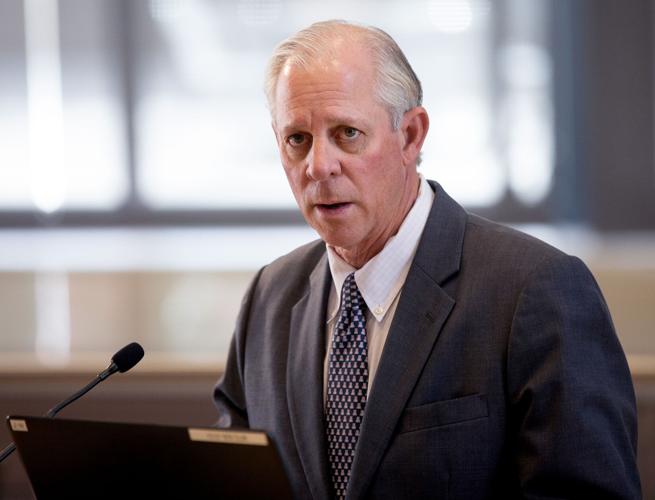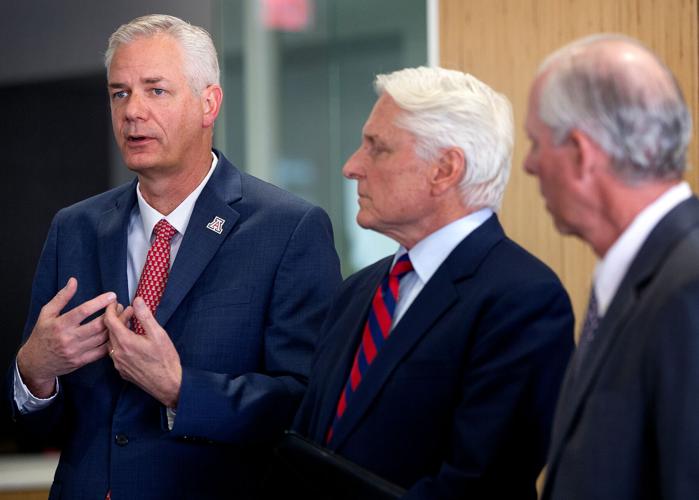While most at the University of Arizona are waiting with bated breath to find out if they will be laid off, one senior administrator seems especially determined to hang on: UA President Robert C. Robbins.
Robbins’ steadfast commitment to managing the financial crisis that he helped create has been frustrating to university stakeholders and employees who have spoken out.
This week, Faculty Senate Chair Leila Hudson said what she calls “the no confidence meter” for Robbins is “off the charts.” Two weeks ago, the United Campus Workers of Arizona union called for Robbins to resign. And in a letter last week to the Arizona Board of Regents, Gov. Katie Hobbs questioned whether there should be “changes to leadership” at the university.
Asked Wednesday if she thinks Robbins should go, Hobbs told Capitol Media Services: “I haven’t gone that far. We’re going to let this play out.”
“I understand their frustration,” Robbins said this week in his first sit-down interview with the Arizona Daily Star since the university’s financial crisis was revealed in November. “This happened on my watch. I’m totally responsible for it.
“And I’m also responsible for getting the plan implemented and solving this problem, and I fully intend to do that,” he said.
Robbins and UA’s Interim Chief Financial Officer John Arnold announced Monday there will be layoffs at the university and budget cuts between 5% and 15% among the units. The Arizona Board of Regents has committed to paying outside consultants to create action plans for the university’s athletic department, administrative “bloat,” in Arnold’s words, and online UA Global Campus.
Robbins, who has said he spent “12, 14, 16 hours a day” working on the solution to the crisis, said he first heard about the issues in October.
“In anticipation of the presentation (to the regents) in November, I got a call to say our forecasting model was wrong, we actually have 110 days cash on hand,” he said. “How in the world could this forecasting model be so wrong? I immediately tried to understand it and start digging into, well, how could this happen?”
In the three months since he and then-UA CFO Lisa Rulney revealed the UA’s financial crisis to ABOR, Robbins said there have been a lot of misconceptions, including some, he added, he caused.
He and Rulney told the regents the university’s budgeting model had suffered a miscalculation of $240 million.
Robbins calculated that figure because the model had been off in its prediction of the university’s days cash on hand by 40 days. He said he multiplied 40 by six, as he knew the UA had a daily cash burn rate of $6 million. So, when he told the regents on Nov. 2 that the model had miscalculated by $240 million, that was his assumption.
In reality, Robbins says now, the number was closer to $140 million.
“I think we should have probably tried to prospectively address the misinformation that, you know, we didn’t lose $240 million,” Robbins said when asked if he had any regrets about his response to the crisis.
“There’s no fraud, there’s no financial malfeasance. I would have probably done a better job of doing communications around that.”
Robbins said he reverted back to his training as a cardiothoracic surgeon.
“What I was focused on was, how do I get the correct diagnosis?” he said. “Clearly the patient is ill, and we have to figure out the underlying diagnosis so that we can then implement a treatment plan.”
The “medical issues” Robbins has had to spend a lot of time on include those facing the athletics department.
“The question is ‘how much does the university writ large value the market value of strong athletics?’” he said.
Not only does having a strong athletics program attract students who want to experience big gamedays and school spirit, but it also helps with fundraising for the university at large, Robbins said.
“For universities that haven’t been to a bowl game in a long time, the amount of giving to the university dramatically goes up,” he noted.
But the question remains: Even though athletics bring in donations to the university, does that offset the amount that’s being spent on them?
Robbins told the Faculty Senate in December that, since about 2018, the university has loaned the athletics department about $86 million.
“The model of college athletics is broken,” Robbins acknowledged in the Star interview. “The patient is in the ICU and is in critical condition.”
He added that almost every university’s program, besides massive programs like the ones at the University of Alabama, the University of Texas, the University of Georgia and The Ohio State University, are struggling.
“We’re going to have to make some tough decisions,” he said. “Clearly we have to cut cost and we have to increase revenue, while at the same time cutting costs.”
Robbins said cutting sports programs is “on the table.” He added that he was surprised when then-Athletic Director Dave Heeke told the athletic department the university was definitely not going to cut sports.
“Invariably,” Robbins said, pausing for a brief moment, “every university who’s tried to cut sports has been met with a barrage of lawsuits. So, we still have to make those decisions, and those decisions, in my mind, have not been made yet.”
Robbins announced Heeke’s sudden departure from his role as vice president and director of athletics last week. The Star reported that Heeke, who was not fired “for cause,” will retain his salary of over $1 million through the end of his contract in 2025.
Robbins said he “simply thought it was the right time to have new leadership,” as the university will be working with a consulting team to modernize the athletics department and will be transitioning into the Big 12 conference.
“That was definitely my decision,” he said of Heeke’s departure.
Heeke being paid out the rest of his salary is not unusual. In a Dec. 13 ABOR meeting, Robbins announced he had accepted the resignation of Rulney as the UA’s vice president of business affairs and CFO.
But it was revealed by the Star that Rulney is not only still employed at the university in an advisory role, but has retained her salary of over $500,000. In response, the university stated that Rulney is only employed through the end of June to “help with the transition.”
When asked about the transparency issues with Rulney’s dismissal, Robbins said it was mainly to help the university avoid getting sued.
“You can imagine if I fire anyone for cause there’s always going to be a lawsuit,” he said. “They’re going to debate it and it’ll go on forever and it’ll cost us a lot of money. This is something that we do all the time.”
Rulney “had to have something on the HR payroll ledger” in order to pay her through her June 30 contract, he said.
Now that Heeke and Rulney are out, the athletic director and CFO roles are both filled by interim leaders. That’s also not particularly unusual for the UA.
The provost and vice president of research for example, are also both interims. The university, in an effort to find permanent leaders, is scheduled to promote three interims to full time positions: Steve Patterson to chief safety officer, Jenny Lee to vice president for Arizona International and Jennifer Hatcher to associate vice president for diversity and inclusion.
Besides these soon-to-be promotions, Robbins said he hopes to hire a provost and vice president of research sometime this spring.
“I just need to get individuals who want to work with me and our whole team to solve this problem,” he said. “I think there are going to be some candidates who don’t want any part of that. There are others who are going to say, ‘I really want to come and make a difference.’”
He added, after a brief pause, that there is discussion “amongst the faculty and deans” to wait to hire a permanent vice president of research after the permanent provost is announced, but Robbins said he feels confident the university can hire both around the same time.
“I think it’s really important that we get someone this spring,” he said.
This assuredness is one example of Robbins’ belief that the university needs to be “run like a business.”
“I can remember when I arrived and wanted to make some of these changes we’re considering, people were a little resistant,” he said. “But now we don’t have any choice. We’ve got to have good business principles, we’ve got to have efficiencies, we’ve got to be financially responsible and sound. And that is very, very doable.”
Overspending is something that, as the university’s “CEO,” Robbins plans to cut back on.
He said the university initially budgeted about $300 million for its strategic plan over five years, spending about $30 million per year directly out of the central reserves, “because we had really healthy reserves.”
Now those “planned investments” will slow, and in some cases, halt.
“I think that it’s good to invest, but you can’t overinvest,” he said.
One of those investments? Financial aid. The university will continue funding need-based aid to in-state students and those who are currently accepted and enrolled. But, for out-of-state students, it’ll be harder to get those generous aid packages the university is known for.
Robbins emphasized that he has “no intention, zero” to change need-based financial aid, the Native American scholars’ program and the Pell eligible aid given.
“We’re not touching that,” he said firmly. “We’re really going to try to reduce the amount of money we give to out-of-state students.”
He said that “about a third or 40%” of the university’s revenue comes from student tuition and fees. The UA has to stop discounting so heavily, he said.
“The cost of educating students has gone up dramatically with inflation and all these other things,” he said.
“We don’t want this temporary, serious issue to derail us on all the great things that we’re doing,” Robbins said.
“So, we’ve got to have efficiencies (and) fiscal discipline so we can invest in our students and our faculty and staff, particularly around the missions that we have, which are education and research and discovery and new knowledge,” he concluded. “And we’re absolutely going to do that.”





